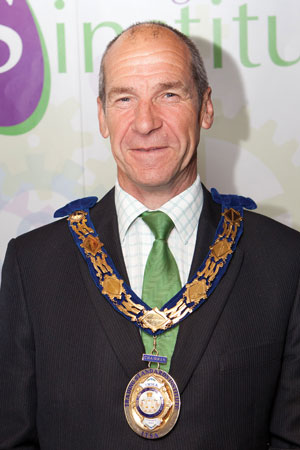Frank le Duc: The Vote

Peerless scambuster elected to top job tackling rogue traders as chairman of the national Trading Standards Institute
When a conman calls in your neighbourhood, who are you going to call? Scambusters! For nearly 40 years Brighton-born John Peerless has been tackling fraudsters, conmen and rogue traders. Scam merchants leave many people out of pocket and may dent their pride. But in the worst cases they ply unsafe goods which put life and limb at risk. Mr Peerless has become one Britain’s leading experts at dealing with them.
In his teens – in 1974 – he started as a trainee weights and measures inspector. The job involved checking that a pint in a pub was truly a pint and testing vehicles on weighbridges. Now trading standards officers investigate loan sharks, food fraud, rogue doorstep traders, counterfeit goods (including fake alcohol and tobacco), animal health and product safety.
They administer the use of official surveillance under the Regulation of Investigatory Powers Act 2000. And they have to be familiar with online buying and e-crime, which can cross international borders. With trading standards teams shrinking, people like Mr Peerless increasingly work as part of a team that includes the police, Revenue and Customs, the fire service and business organisations.
Mr Peerless has spent most of his career as a trading standards officer in or near Brighton and Hove. He rose up the ladder to run the consumer protection service locally. And now he has been elected as the chairman of the Trading Standards Institute, a national organisation which lobbies and advises the government, represents the sector and helps businesses operate in a fair market.
“Rogue traders are rare but when someone is targeted it is very distressing”
Mr Peerless, a rugby-loving father of three, now works part-time in Brighton and Hove, sharing his extensive knowledge on investigations. He is also leading a project for Ealing Council to tackle rogue trading in part of the London borough. He said that it could be hard to put across how dangerous fake goods were. He said: “We found 67,000 cheap mobile phone chargers in one premises. The trouble is if someone buys one for £5 and it doesn’t work, people will shrug it off and not think they have lost much, but what if it overheats and ruins your phone or even sets fire to the house? It’s difficult to assess what the detriment to the consumer is. It could potentially be 67,000 unusable phone chargers or numerous damaged phones but possibly properties damaged by fire”.
Over half of the respondents in a recent national survey said that they had bought counterfeit goods, with 18 per cent saying that they had bought fake alcohol and 16 per cent fake medicine. The Office of Fair Trading puts the cost to consumers at about £3 billion.
Some years back Mr Peerless had to deal with loan sharks targeting some of the poorest people in Brighton. He suggested setting up a credit union. He said: “It started from nothing. We invited people to come along to a workshop in Whitehawk to explore the idea. About 25 people came and it went from there”. In the early days Mr Peerless gave up every Saturday to help with the scheme. It eventually became the widely respected East Sussex Credit Union.
When Brighton and Hove councils combined in 1997, Mr Peerless became the head of service and joined the regional group of 19 councils, Trading Standards South East, which worked together to achieve consistent cross-border enforcement. In 2009 he was seconded to Surrey County Council to run the Scambusters team which supported 62 councils in the south east, London and east of England to tackle cross-border crime.
Reflecting on his role over 40 years, he said: “The best thing about the job is making a difference to the lives of consumers, helping to protect them”. And his best advice is for consumers? “If it’s too good to be true, it probably is. Also, if someone approaches you, ask them to come back when someone is with you. If they are intent on fraud they will not be making that second visit.”





















